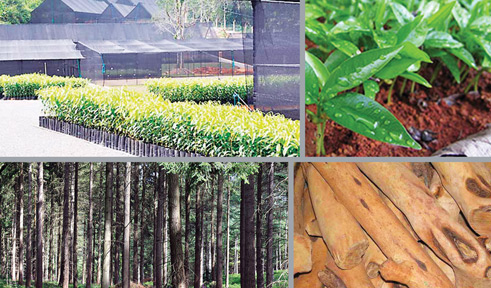Sustainable commercial crops boost economic growth
Nations around the world have realised that industrialisation as an
economic process has resulted in great harm to the environment and the
urgent need to create an eco-friendly environment must be addressed.
Global warming and environment transformation has caused the human
race to change activities towards creating a more ecological
environment.
Today, sustainable commercial forestry plantations occupy a special
place among sustainable economic activities. Instead of the continued
destruction of national forests, the human race is now objectively
engaged in commercial forestry in a sustainable manner.
 Commercial forestry broadly has dual purposes, forestry plantations
for timber and for non-timber purposes. Commercial forestry broadly has dual purposes, forestry plantations
for timber and for non-timber purposes.
By engaging in commercial forestry several environmental and social
advantages can be obtained. Through commercial forestry, natural
resources can be used to create a profitable venture on a long-term
basis.
With regard to forestry plantations supplying timber, the forest
reserves have to be used properly and replanting should take place
protecting the undergrowth.
Despite the absence of similar programs in Sri Lanka, countries have
achieved successful economic returns through carbon credit auditing,
which in turn provides the encouragement a country needs to propagate a
green economy.
The carbon credit auditing program corresponds to the CO2 equivalent
removed or not emitted into the atmosphere.
As a result, countries that have forest preservations are reaping
monetary returns. Moreover, through this program, water quality is
improved, pollution reduced, enhancing the livelihoods of mankind and
animal species.
Sri Lanka does not have a long history of commercial forestry. While
the use and conservation of forests is under the Government, there is no
evidence to suggest that any forward thinking plan existed with regards
to its economic potential.
The potential of this sector was highlighted with the advent of the
private sector from which new technology, research and development
created much headway. During the period when only the Government was
involved in forestry and conservation, returns on commercial forestry
had a wait for over 40 years.
However, with the involvement of the private sector this has been
reduced to receiving returns after a 20-year period.
It has been the successful intervention of the private sector which
have been spearheading the popularity of commercial forestry especially
crops unrelated to timber.
At the onset, commercial forestry crops were not considered secure
investment opportunities, especially as Sri Lankans were not keen due to
the long wait of nearly 17 years to receive returns.
Moreover, there was no involvement by the Central Bank or any
Government regulations or regulatory body governing the sector.
According to industry experts commercial forestry plantations have
reached commercial success.
Due to the intervention of the private sector, investments in
commercial forestry have also risen tremendously.
Moreover, these organisations have employed modern breeding
technology which is unique to Sri Lanka, thereby creating a new market
for non-timber plantations crops such as sandalwood and agarwood and
increasing foreign exchange earning potential. Agarwood home garden
crops create employment opportunities and helps alleviate poverty in
villages.
Those involved in commercial forestry in the private sector should
educate the public and act in a responsible, lawful manner so that
commercial forestry can be sustainable.
As a pioneer in the industry, Sadaharitha Plantations have employed
sustainable methods in its commercial forestry plantations. Returns from
Agarwood investment can be obtained within eight years.
A hallmark of sustainable forestry is managing forests as renewable
resources. This factor is followed by Sadaharitha Plantations.
Sadaharitha Plantations', Chief Executive Director, H.K. Rohana said,
"Cutting down trees in a sustainable manner while planting new trees
does not harm the environment and therein lays the main theory behind
successful sustainable commercial forestry." - Sadharitha Plantations
press release |

